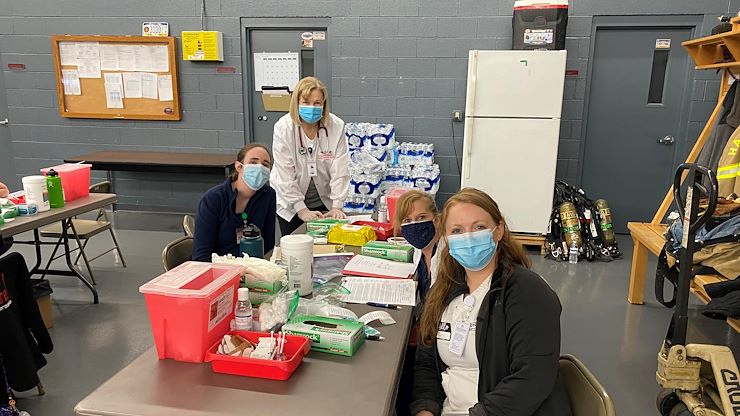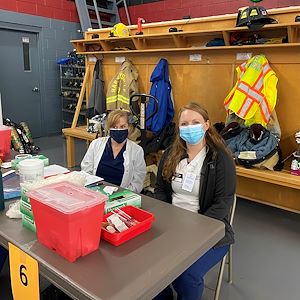
Senior Lecturer Gretchen White, Lecturer Stephanie Plunkett and students Cathy Nanovic and Piper Stacks are among the 35 students and 15 faculty from the Nursing program, who have volunteered to administer COVID-19 vaccines throughout the community this month.
Joining the fight against COVID-19, Montgomery County Community College (MCCC) Nursing students and faculty volunteered their time administering vaccines to community members at area distribution centers.
Over the last month, a total of 35 students and 15 faculty assisted Rann Pharmacy staff and volunteers at vaccine sites including Nor-Gwyn Pool in North Wales, Pennbrook Middle School and Harleysville Community Fire Company. Students in introductory and second year Nursing courses, and their professors, administered the vaccine, helped with paperwork, reconstituted the vaccine mixture and drew it into syringes. Rann supplied proper personal protective equipment for all volunteers to keep them safe and offered vaccines to any volunteer that wanted one.
Students and faculty were scheduled to volunteer again at a vaccine site at Doylestown Hospital Tuesday, April 27.
“It’s been a great experience. Students have gotten to do a lot,” said Dr. Linda Roy, Director of the MCCC Nursing Program. “They got a lot of practice during the vaccine clinics and, in addition, they were able to help the community.”
While students were excited to help, Roy noted that many students had limited experience in giving vaccines. For some it was their first experience, as COVID has limited clinical experiences.
 “Students were excited but nervous,” said Roy. “Faculty walked through the procedure
with each student individually, even if they had given a vaccine before. Faculty then
observed each student give a few vaccines and provided feedback. Once they got started,
we couldn’t stop them. It was good. They really seemed to enjoy it and got a lot of
experience.”
“Students were excited but nervous,” said Roy. “Faculty walked through the procedure
with each student individually, even if they had given a vaccine before. Faculty then
observed each student give a few vaccines and provided feedback. Once they got started,
we couldn’t stop them. It was good. They really seemed to enjoy it and got a lot of
experience.”
Nursing student Ryan Payne, 42, of Lansdale, volunteered at two different events and said the experience was like a “well-oiled machine.”
“It was a really positive experience,” he said. “We learned about the disease, how to reconstitute the vaccine and we were able to give back to the community.”
Another student, Joyce DiSimoni, 60, of North Wales, said she appreciated gaining experience she’ll need for the future.
“It was super well-organized,” she said. “I appreciate the fact students were there not just to give shots or do paperwork, but rotated through stations which included reconstituting the injections. It was good practice.”
Roy emphasized the importance of community members getting the vaccine, especially older adults and those with underlying health conditions.
“We don’t want them to get COVID,” she said, “And there can be lingering disorders, such as respiratory disorders, the older a person is, after the virus.”
The other issue is while there is enough supply of the vaccine, many sites don’t have enough people to administer the shots. That’s why having volunteers like students and faculty there to lend a hand, helped play an important role, she said.
“Students and faculty gave up their time to help the community. It was a great experience,” she said. “The community has been nice too. They are excited to be there and happy to get the vaccine. It was nice. So often in clinical settings, you give a shot to someone and they don’t want it. The community rolled up their sleeves and said use this arm. Students were worried they were going to hurt them. But the community didn’t care. The students did a great job and most community members said they didn’t even feel the shot. It is a great experience for students and faculty.”
Approximately 230 students are currently enrolled in MCCC’s Nursing program, which recently received full reaccreditation from the Accreditation Commission for Education in Nursing (ACEN). The decision allows the program to graduate students that are eligible to take the National Council Licensure Examination (NCLEX-RN), which students must pass in order to become licensed registered nurses.
MCCC’s Nursing Program students led the way on the NCLEX-RN, with a first time pass rate of 95.58 percent. In order for the Nursing Program to maintain approval status from the Pennsylvania State Board of Nursing students taking the exam must obtain a first time pass rate of 80 percent.
MCCC graduates go on to work in a variety of healthcare settings after graduation including area hospitals, rehabilitation centers, mental health facilities and home care operations, to name a few.
